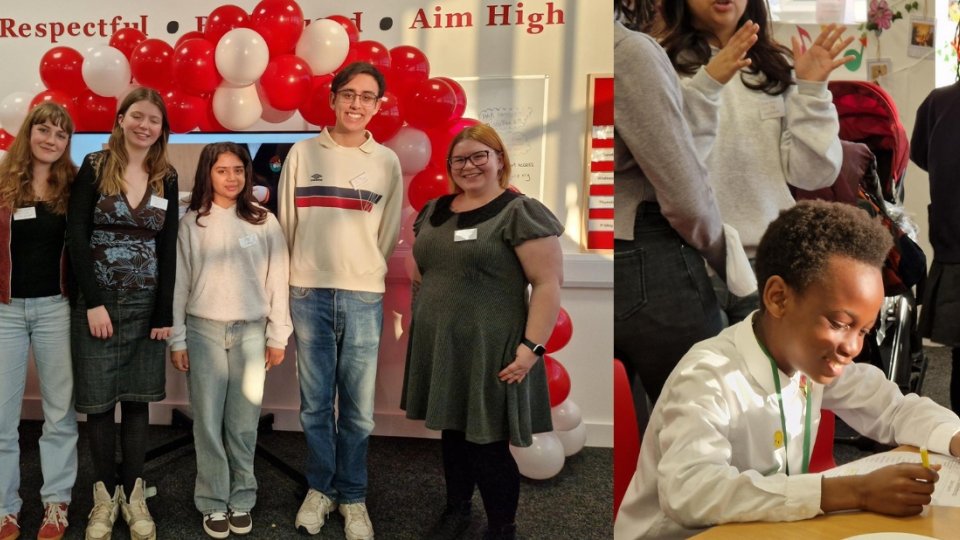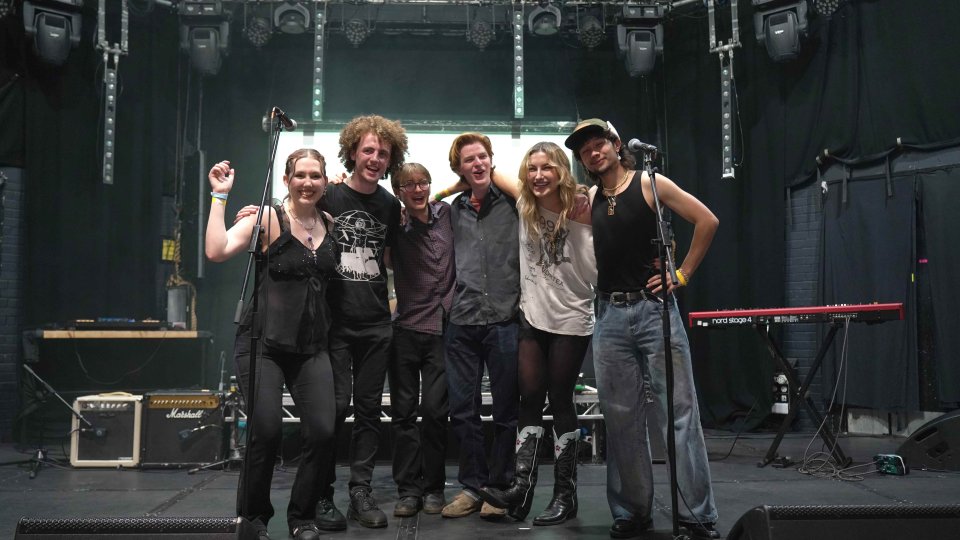
Mica is from Bury in Greater Manchester (north-west England). She did A levels in English, Maths and Further Maths and studied Philosophy here at King's College, Cambridge.
What is interesting about your subject and why did you choose to study it at Cambridge?
I fell into studying Philosophy quite late - I hadn’t taken it at A-Level, but I started reading some Philosophy books on holiday over one summer and realised I wanted to study it at University. What’s interesting to me about Philosophy is the way that it’s not always so much about answers to questions as the process of answering them. Rigorous argument is really important, and you come to realise there is a ‘philosophical’ way to look at most things. This generally involves being quite pedantic! Within Philosophy, I find Ethics and Political Philosophy the most interesting. Since I didn’t study Philosophy before University, many schools of thought are new to me. What’s different about Ethics and Political Philosophy is that since these disciplines have more practical application, you will find you have intuitions on the topics already. When this happens, the reading is generally more engaging, since you are able to compare the writer’s argument against what you think to be right.
What was starting at King's like? Did you find it easy to settle in?
Starting at King’s was so so exciting! The run up to coming here was really odd: there was a lot to do, like buying things I needed for living away from home and packing, but the time in the week before coming seemed endless. I read every bit of information I could find about life at Cambridge or in King’s, just to get a sense of what was coming. Some of the information was useful, but there are some things the internet just can’t tell you - like what it’s like to stand in your new room for the first time, or what it’s like to stand in King’s Chapel for matriculation. Fresher’s Week was surreal, busy and (again) incredibly exciting. I’ve never met so many new people at once! I think the college system is particularly valuable at this time, since it makes it so easy to meet people. You’ll start to recognise faces really quickly, and this can mean a lot when you’re away from home.
I found it quite easy to settle in really, although I’d say I didn’t feel like Cambridge was ‘home’ until the end of Michaelmas term. The end of the term is a great time for reflection; it’s amazing how far you can come and how much you can learn in 8 weeks. I would tell incoming students not to worry about making friends or settling in. It really will just happen, without you noticing - and if it doesn’t for any reason, there is plenty of college support to turn to.
What do you do in supervisions and what preparation do you have to do in advance? What is being supervised like?
In supervisions - which are one-on-one for Philosophy, usually - I discuss the essay I’ve written and submitted across the previous week with my supervisor. Different supervisors have different styles. Some like to work through the essay chronologically, flagging up points that I haven’t explained so well or that they wish to discuss further. Others like to discuss the topic more generally, and ask me questions regarding my thoughts on the reading or certain issues within that topic. Some supervisors speak more than others, or ask more questions than others. The experience of being supervised is therefore quite varied, but I’d say it’s in supervisions that I’m most interested in my subject. They really push you to engage with your argument and refine your thoughts. In terms of preparation, the bulk of it is reading for and then writing the essay. I usually skim my essay before going into a supervision, but nothing more than that.
Where in College do you live this year? What is it like?
This year - my second year - I live in Webb’s Court, which is the same court that houses the library. The way accommodation works in King’s is that First Years are automatically given a room after selecting between Keynes (en-suite, in college) and Spalding Hostel (out of college, better kitchen facilities). In February, you enter the room ballot - with a group of friends, if you like. You get put into a random order according to which you select your room for the next year, and that order is reversed for final year. My friends and I were quite low down the ballot in first year, and were really worried we wouldn’t be able to stay together. Luckily, there were enough rooms in a staircase in Webb’s that we really liked. I absolutely love my current room. It’s an attic room, so smaller than other rooms in the staircase, but it’s really light and I’ve made it cosy. Even though we share a bathroom between 6, this is rarely a problem and my room is right next door to it. It’s also been great having better kitchen facilities this year. I’ve cooked more than I anticipated, and having the option is great for flexibility.
Next year, I’m living outside college for the first time! It’s still college accommodation, but it’s located across the road just off King’s Parade. My room will be en-suite again, and the kitchens are even better than this year. It will be quite different not being so close to servery and the bar, but I’m certain I’ll adapt. It’s been cool to experience a range of accommodation - I think I’ve been really lucky with my room choices.
What is your workload like and is there time to do other things?
One thing I like about Philosophy is that the workload is very consistent. Students from other disciplines can find they have weeks with lots of work, and other weeks which are relatively quiet. With Philosophy, you know what you will have to complete in any given week and I find this reassuring. It’s easier to manage and plan work when you’re aware of what’s coming. The key part of the workload are the essays. You will have 8 essays across the term, so an essay per week. The way in which you go about writing your essay is completely up to you. Different philosophy students have different styles; and it’s about finding what you prefer. My approach is quite organised and rigid, because this is what works best for me. I spend three days reading for my essay, following the reading list given to me by my supervisor. I then spend a day and a half ‘gathering my thoughts’ on the topic and planning my essay, a day and a half writing, and a day editing. This is flexible depending on how much reading I’ve had that week, and I often don’t need as much time as I set out for myself. Other friends in Philosophy write and read for their essay as a contiguous process. Some people I know don’t write plans, others work best by reading slowly and then writing in a short space of time. It really is whatever you find most useful.
There’s definitely time to do other things! As I just mentioned, the workload for Philosophy is consistent. A big advantage of this is you can plan your week to fit in whatever extra-curricular or fun activities you want to do. Self-managing your time can seem daunting at the beginning of University, but you will be the envy of your friends for having less ‘contact hours’ and being able to decide when you want to work and when you want to relax. I tend to work during the day and take the evenings to do other things. Some people prefer working at night and enjoying free time in the morning or afternoon. Basically, you will not be working 24/7 at Cambridge. Free time is important and possible!
What do you like to do when you're not working?
When I’m not working, I like to relax in lots of different ways. I try to go to the gym or running fairly regularly (though some terms this is less than others!), and I also think it’s important to have some ‘quiet’ time just sat in bed reading or watching a film. Otherwise, I love spending time with my friends. We go to the cinema or out to eat, cook together or go clubbing. I also enjoy watching a film with my friends in somebody’s room, or just hanging out in the bar and playing pool. Especially living with my friends in Second Year, it’s so easy to pass time when not working: you can just nip downstairs for a chat and a catch up.
Formal Dinners are also a highlight of life at King’s, and a really great way to spend time when not working. Since Formals are on Wednesday, they mark the end of the Cambridge week. I really like making a proper evening of it: I start getting ready with friends in the late afternoon, then go to the Formal for dinner and then to the post-Formal entertainment in the bar. My friend has recently started DJ-ing in King’s, and it’s really fun when everyone in college comes together to dance and get away from work. I then usually go clubbing. All the clubs are very close to King’s, so there is no cost for transport on a night out and it’s so easy to get home if you get tired or need to go to bed. The nightlife in Cambridge is distinctly cheesy at times, but I really enjoy it. If ‘cheesy’ isn’t your scene though, there are definitely alternatives.
I also have more ‘structured’ extra-curricular activities that take up some of my time when I’m not working. Over the past year, I’ve been the Food and Drinks representative for the King’s Affair. The King’s Affair is King’s ‘May Week’ event: we host 1500 people, and the event lasts from 10pm-5am. It’s also fancy dress, which makes it something different and really fun! My role on the committee has been to source the food vendors and make the drinks order, including arranging the logistics of serving food and managing the food/drinks budget. This has been a really good thing to get involved in outside of work. After a day of reading, it can be really refreshing to do something more practical and non-academic.
Recently, my friend Joanna and I were elected to be Access Officers on King’s College Student Union, and so this also takes up some of my time when I’m not working. The role lasts a year, so we are recently getting stuck in. At the end of Lent Term 2017, we went on King’s yearly ‘Access Bus’, visiting roughly 30 schools in the North East across four days. We delivered presentations to classes of Y10 pupils in each school, explaining some things about life in University in general - the finance; the accommodation; the possible courses. We also answered any questions they had about Cambridge or Higher Education. It was a really fun trip, especially since when we weren’t visiting the schools we got to drive and explore the local area - there’s a beach! I’m really looking forward to doing it again next year, and hopefully we made some young people start thinking about their future and made them aware of things they might not have known previously. I’ll also be helping on interview desks and with CUSU’s shadowing scheme, which I’m really looking forward to.
How far do you have to go to get to the faculty? Where do you do most of your work?
Something I love about King’s specifically is how central we are! Our location is especially convenient for humanities students, since our lectures are held at the Sidgwick site, which is only a 5-10 minute walk away. Our faculty is also at the Sidgwick site, meaning I rarely have to travel far at all for work unless I have a supervision in a more remote college (which has been pretty rare so far).
Cambridge is great for having lots of work spaces that offer really varied environments. I like to vary my places of work quite a bit, just to stop myself from being bored and to keep my productivity up. That said, I have four main places of work: my room, the King’s library, the Philosophy library, and King’s Coffee Shop. When I need to work more intensely, I go to King’s library or the Philosophy, since the quiet helps me to concentrate and it is quite a studious atmosphere. If I have more ‘casual’ work to do, I can happily work in my room or the coffee shop. If I’m feeling less motivated to work, going to the coffee shop is especially good since I can promise myself a snack or drink as a ‘reward’ for getting started. The caramel shortbread is amazing! I also like working with white noise or music playing out loud sometimes, and that’s what my room and the coffee shop are good for. Recently, I’ve also been doing some work in the Philosophy Common Room, which is another quite ‘chilled out’ space where I can talk to friends if I want to or have a cup of tea or coffee while I read.
What was your gap year like?
Some students who take gap years apply for deferred entry, so apply for University when still in College. I chose to apply after I left college, having sat my A-Levels, but I was able to keep in contact with my tutors from college who read over my personal statement. I took a gap year because when I started my second year of college, I was unsure what I wanted to study. None of my subjects particularly appealed to me! I’d recently come across Philosophy at a summer school I attended, but wasn’t sure I had enough knowledge or interest yet to apply to study it. Taking the year helped me to make up my mind, and I was able to look into Philosophy in the summer after my Sixth Form exams to see whether it was something I wanted to pursue. I didn’t spend the year travelling, as the stereotype goes - I took it as a bit of an opportunity to spend some time at home and working in customer service. I’m really glad I used the time like this. Having a job is very different to studying, and it was such a welcome change of pace. I also enrolled in Manchester College to take an ABC Level 2 Patisserie and Confectionary qualification - again, completely different to A-Levels, and definitely not something I would have had the opportunity to pursue had I gone straight into university. By the time the time came to go to university, I felt much more prepared, confident and ready to leave home.
How did you find the application process?
I tried to approach the application process in quite a straightforward way. Since the pooling system is in place, there is no need to worry about the size of the college you’re applying to or the number of applicants to that college: the pooling system will ensure that this doesn’t have an effect on whether or not you get an offer. I was also relatively lucky in that I took a gap year, so when I applied to Cambridge I already had my A-Level grades and could list them on my application, along with my UMS results.
With these things in mind, I consulted some different websites to choose the college I liked best. Key criteria for me were location, accommodation (I wanted the chance to live in college all three years), price and quality of food (King’s servery and bar are among the cheaper in the University, and of decent quality), and the availability of other facilities like a gym and piano rooms. I narrowed it down to a few colleges, and ended up choosing King’s. I couldn’t be happier with my choice!
I tried to do some preparation in the week or so running up to my interview. Since I had little grounding knowledge of Philosophy, I wanted to learn some things that I could refer back to. I think this was probably helpful, even if only for increasing my confidence. I read some summaries of schools of thought online and listened to some Philosophy podcasts, and both of those things were really useful.
The night before my interview, my Dad drove me down to Cambridge. He stayed in a hotel, and I stayed in College. Since I live in Manchester - roughly a four hour drive away - I thought it much better to do this, and avoid being late on the day due to traffic. Getting public transport would have worked equally well - it’s certainly not necessary to have a parent bring you. The following morning, all Philosophy applicants sat a short exam. I then had a few hours before my interview, during which I went to a cafe and read a book I had with me. Then I had my interview, which lasted about 30 minutes. My main advice would be not to panic about the process. The interviewers are not there to scare you or put you off. They want to see the best you have to offer. Think about questions before you answer them - it’s not a bad thing to need a minute to think about your answer. The interview process is quite involved, but don’t let this put you off. The pay-off is worth it, and (as always) there is support from University staff if necessary.


